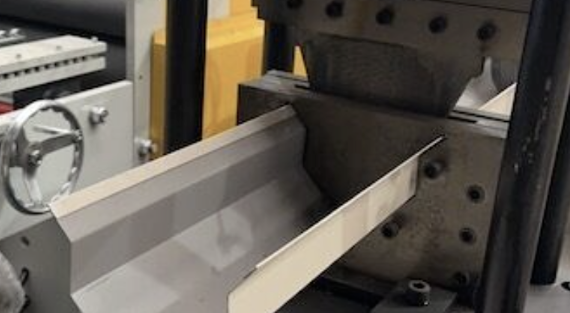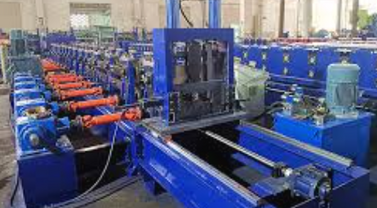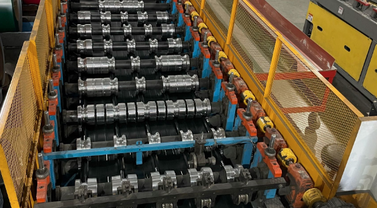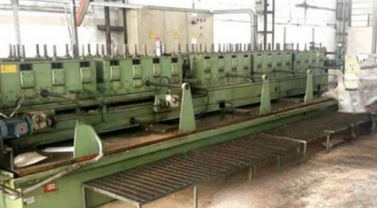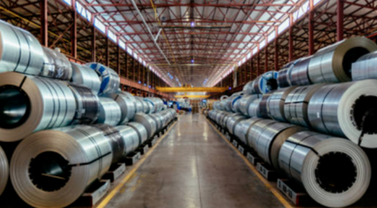The PBR corner - inside flashing roll forming machine is a specialized piece of equipment designed for manufacturing precise and high-quality inside corner flashings used in various metal roofing and siding systems. This machine offers exceptional reliability, versatility, and efficiency, making it a vital tool for industries requiring customized corner flashing profiles.
Machine Description
The PBR corner - inside flashing roll forming machine is engineered to produce corner profiles with precise dimensions and a clean finish. Its robust construction, advanced automation features, and cutting-edge technology ensure optimal performance while minimizing material waste.
Key Features:
- High Efficiency: Produces consistent profiles at high speeds with minimal downtime.
- Precision Engineering: Advanced rollers and cutting systems ensure dimensional accuracy and smooth finishes.
- Customizable Design: Can be tailored to produce various sizes and gauges based on specific project requirements.
Machine Specifications
- Roller Materials:
- Made from hardened steel with chrome plating for durability and corrosion resistance.
- Heat-treated for extended lifespan.
- Punching and Notching:
- Equipped with hydraulic or servo-controlled punching and notching systems for precision cutouts and holes.
- Customizable die sets for specific designs.
- Servo Motors:
- High-torque servo motors for precise control over feeding and forming processes.
- Energy-efficient and low maintenance.
- Hydraulic Cutting Systems:
- High-speed hydraulic cutting ensures clean and burr-free cuts.
- Programmable for various lengths and angles.
- Frame Size:
- Rigid and durable frame made from structural steel.
- Reinforced design to minimize vibrations and enhance stability.
- Motors and PLC System:
- Fully automated system controlled by an advanced PLC (Programmable Logic Controller).
- User-friendly interface with remote monitoring capabilities.
- Machine Speed:
- Operates at speeds of up to 30-50 meters per minute, depending on profile complexity.
- Safety Guards and Enclosures:
- Enclosed structure to ensure operator safety.
- Equipped with emergency stop buttons and safety sensors.
Profile Description
- Materials:
- Steel (galvanized, pre-painted, or stainless).
- Aluminum or other metal alloys.
- Sizes:
- Customizable widths and heights to fit various roofing and siding applications.
- Material Gauge:
- Supports a range of gauges from 0.3mm to 1.2mm, depending on requirements.
- Market Size & Industries:
- Used extensively in construction, metal roofing, and siding industries.
- Popular for its role in sealing and aesthetic finishing for metal buildings.
- Popular Countries:
- United States: High demand due to widespread metal building installations.
- Australia and New Zealand: Increasing adoption in architectural and industrial roofing projects.
- Middle East: Growing preference for durable and weather-resistant metal components.
Optional Extras
- Stackers:
Automatic stackers for efficient handling and storage of finished profiles. - Remote PLC Systems:
Enables remote monitoring and troubleshooting. - Coil Car Tippers:
Simplifies the loading and unloading of heavy coils. - Uncoilers and Recoilers:
Facilitates smooth feeding and recoiling of metal coils. - Automatic Stackers:
Improves post-production logistics by automating the stacking process. - Leveling Systems:
Ensures flat and uniform material feeding for precise forming. - Coil Handling Systems:
Integrated solutions for managing multiple coil types and sizes.
Machine Pricing
- Low Range:
- Basic models without advanced extras: $30,000–$50,000.
- Mid Range:
- Includes hydraulic systems and basic PLC automation: $50,000–$80,000.
- High Range:
- Fully equipped machines with all optional extras: $80,000–$150,000+.
Setup and Installation
- Pre-installation Preparation:
- Ensure a leveled floor and sufficient power supply.
- Arrange for coil storage and handling areas.
- Installation Process:
- Assemble the machine and align rollers.
- Calibrate punching, cutting, and forming systems.
- Integrate PLC and test operations.
- Training:
- Provide operator training on safety, maintenance, and troubleshooting.
Maintenance Requirements
- Daily Maintenance:
- Clean rollers and check for wear or damage.
- Inspect hydraulic and servo systems for leaks.
- Weekly Maintenance:
- Lubricate moving parts and inspect electrical connections.
- Check safety systems for proper functionality.
- Long-term Maintenance:
- Replace worn rollers and dies periodically.
- Update PLC software as needed.
Questions and Answers
Q1: Can this machine produce profiles of different sizes and gauges?
A: Yes, it is designed to handle various sizes and gauges with adjustable rollers and dies.
Q2: How long does it take to set up the machine?
A: Typical setup time is 2-3 days, depending on site conditions and machine complexity.
Q3: What are the power requirements for this machine?
A: Power requirements vary by model, typically ranging from 220V to 480V, 50/60Hz.
Q4: Is training provided for machine operators?
A: Yes, comprehensive training is provided to ensure safe and efficient operation.
Q5: What is the warranty period?
A: Most manufacturers offer a warranty of 1-2 years on critical components.
